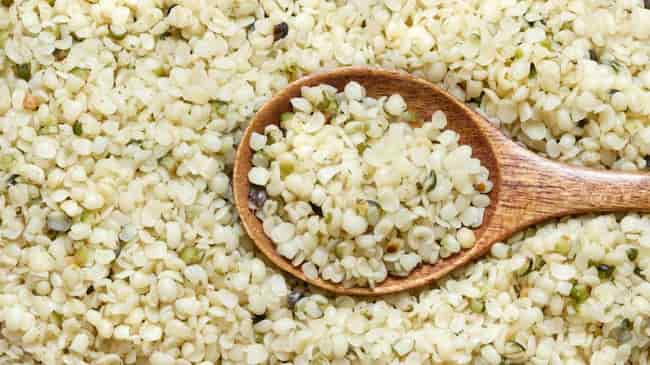Benefits and Side Effect of Hemp Seeds
Hemp seed is the true “superfood”. It is a complete protein source and contains all nine essential amino acids that our bodies cannot produce on their own. Hemp contains high amounts of iron; magnesium, potassium; phosphorus; calcium; fiber; chlorophyll, and vitamin E.
It also contains small amounts of vitamins D, B1 (thiamine), B2 (riboflavin), and B3 (nicotinamide) as well as vitamin A, C, and all of the essential amino acids required by the human body. It is even high in omega-3 fatty acids that are known for reducing inflammation to promote healthy skin, hair, nails, bones, and joints.
Hemp seeds contain “good” fats and proteins – like omega-3s and gamma-linolenic acid (GLA) – as well as fiber, antioxidants, magnesium, potassium, phosphorus, calcium, iron, and zinc.
Hemp seed is an excellent source of protein. Hemp seed contains 25% protein, with a well-balanced amino acid profile making it an ideal choice for vegans or anyone looking to stay away from meat.
Hemp seeds are gluten-free and are used in all sorts of cooking. From hemp milk, hemp tofu, hemp butter to even using the whole seed!
Amino acids are the building blocks of proteins. Hemp seed contains all nine essential amino acids, with a high concentration of both methionine and cysteine. Because hemp protein is also complemented by healthy doses of omega-3s, you’re getting one complete protein that has an ideal ratio for human needs.
Hemp seeds are particularly rich in gamma-linolenic acid (GLA), which has been found to support healthy skin, maintain hair growth and bone health. Furthermore, GLA helps fight inflammation and may prevent symptoms of arthritis by reducing the activity of inflammatory molecules.
Hemp seed is also rich in minerals like calcium, phosphorus, iron, zinc, manganese, and magnesium. These minerals are essential for the body’s healthy growth and development. Further research into hemp seeds has shown that they can be a great source of vitamins like vitamin E (a known antioxidant) and vitamin D (essential for bone health).
Hemp seeds are also high in fiber. A single ounce (28 grams) of hemp seeds contains 10 grams of fiber or 40% of the recommended daily intake. Fiber is especially important for improving digestive health and supporting weight loss by curbing appetite and increasing satiety levels.
There’s more! The hemp seed oil has been shown to improve blood sugar and lipid levels as well as reduce symptoms of eczema, psoriasis, and arthritis.
Due to the high concentration of omega-3s and GLA, hemp seeds can improve cognitive function and decrease inflammation. Since hemp seed is a complete source of protein and contains all essential fatty acids required by the human body (including omega-6 and omega-3), hemp seeds can help to reduce the risk of heart disease and other chronic diseases.
Hemp seeds do not directly cause a positive drug test because they don’t contain enough THC. The confusion arises from the fact that hemp plants are primarily made up of cannabinoids (CBD), which looks like tetrahydrocannabinol (THC) – the main psychoactive substance in marijuana.
These substances have long been confused and conflated by both lawmakers and the media, which has led to a lot of misinformation about hemp seeds as a whole.
Side effects of hemp seeds:
“Hemp seeds are virtually the only source of edible protein that contains ALL EIGHT essential amino acids, which is considered to be one of the most important criteria for a complete and easily digestible protein. They contain up to three times more omega-3 than walnuts do.
Average hemp seed can have up to 22kcal and 3g of fiber, which is much more than in other seeds. The hemp seed oil contains about 70% linoleic acid, an essential fatty acid that humans mostly get from dietary meat and eggs.”
Hemp Seeds Nutrition Facts:
hemp seeds contain almost the perfect ratio (1:3) of omega-6 to omega-3 fatty acids that help to lower the risk of heart disease. They are rich in vitamins A, B, and C, iron, copper, zinc, and magnesium. Hemp seeds also provide an ideal ratio of omega-6 to omega-3, which helps reduce the risk of many diseases and can help keep you young.
Two tablespoons (30ml) contain 4g protein. Hemp Seeds are one of the best dietary sources of GLA – an Omega 6 Essential Fatty Acid that helps “lower cholesterol levels, ease arthritis signs, fight depression, keep skin soft and protect against PMS.”
Hemp Milk Recipe:
Ingredients:-
– 2 tablespoons (30ml) hemp seeds
– 3 cups (700ml) cold water
– ½ teaspoon vanilla extract
Procedure:-
1. Place all ingredients in a blender and blend until creamy. Pour into glasses and serve. Hemp Seeds Paste recipe(Groundnut and Hemp Seed Paste (Noolputtu)) Ingredients:-
– 1 cup hemp seeds
– ½ cup groundnut
Procedure:-
1. Dry roast the hemp seeds until they start changing their color and get a distinct aroma.
2. Grind the roasted hemp seeds to a powder using a pestle and mortar or blender.
3. Dry roast the groundnuts without any oil and keep them ready.
4. Grind the groundnuts to a smooth paste using blender or pestle and mortar, add some water if required to ease out grinding.
5. Pour half a cup of water into grounded hemp seed powder and mix well with a spoon.
6. Slowly pour one cup of water while stirring continuously.
7. Grind the paste to a fine paste, add a little more water if required.
8. Add groundnut paste into hemp seed paste and mix well by stirring continuously until it gets thick mass which can be rolled like a ball.
9. Serve immediately or store in the refrigerator for later use.
Side effects of Hemp Seeds:
Hemp seeds can cause psychosis and also interfere with certain drug tests.
The seeds contain an oil that is known to cause “hepatic veno-occlusive disease (VOD)” in some people.
Hemp seeds have an enzyme called thioredoxin reductase which can lower blood sugar levels similar to how normal insulin dose.
